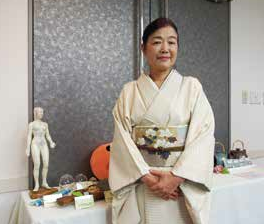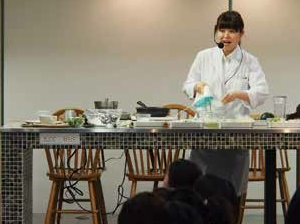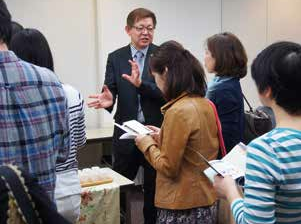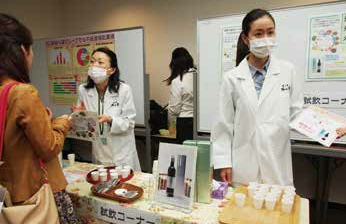Issue:




Pregnant with ideas Left to right, midwife Shoko So in front of acupuncture information; former nurse Kokoro Sano gives healthy eating for pregnancy advice at her cookery class; Dr Yuichi Nishino, trained in Western and Chinese medicine, at one of his presentations; advisors at Dr Nishino’s presentation.
Japan is desperately in need of a higher birth rate and more working women. But the stresses of getting pregnant later in life are not making it easy.
An elderly woman in a traditional cream coloured kimono and elegantly upswept hair is asking questions. “When we talk about a normal sex life, how often does sexual intercourse take place? Please raise your hand if you think that once a week is normal.”
Her audience in a nondescript hotel seminar room in Tokyo consists of several dozen couples, many in their thirties, and a few solo women. A few hands go up. “Does anybody think that twice a month would be enough?” No one raises their hands, but she does not relent: “Or would three times a week be better?” Again, a few hands go up.
Shoko So nods in agreement. A trained midwife, she heads a birth clinic in Tokyo, and her talk this Sunday afternoon is on ninkatsu. The word “ninkatsu” was coined relatively recently, consisting of nin from ninshin (pregnancy) and katsu from katsudo (activity) meaning the efforts women make to prepare for a possible pregnancy. Despite, and because of, persistently low fertility rates and fewer births, the pregnancy business is booming. Various stakeholders seminar organizers, health service providers, yoga teachers, pharmacies, clinics and the like are benefiting from the rise in the average marriage age and the resultant late start to attempt conception.
Ninkatsu services largely target only women, although usually both partners wish to have children. And the pressure on women, not only from the industry, but also from politicians and from society as a whole, is increasing. In this age of “Womenomics,” despite women being encouraged to enter the work force and attain management positions, one thing has not changed: To be a “true” Japanese woman, one must become a mother.
GETTING PREGNANT IN JAPAN is mainly a woman’s job, says former nurse Kokoro Sano. “That is the culture here.” Sano advises participants in popular ninkatsu cooking seminars at Tokyo’s ABC Cooking Studio on how to eat healthily to prepare their bodies for future motherhood.
A teacher is showing 70 participants how to make spinach pancakes. Spinach, she says, has a lot of folic acid. It is good for the female body and can help them become pregnant. The participants, mostly women between the ages of 25 and 45, listen attentively and take notes. They learn that nowadays many women have too much fat in their bodies from too much meat, too many sweets and too little physical activity. The result is a lack of energy and a higher hurdle to pregnancy. The teacher tells them to consume a wide variety of healthy foods, to eat enough and to encourage their partners to do likewise. Further advice includes plenty of sleep, sports, stress reduction and keeping warm.
Men, although welcome, rarely attend the seminars, Sano says, but she has the impression that most women prefer it that way. Although the seminars exclusively deal with food related facts, ninkatsu is still a sensitive topic, perhaps due to the lack of sex education at school. “It is not discussed as openly as in other countries,” she says.
Sano criticizes Japanese women for being too extreme. “Either they work like crazy or they concentrate exclusively on ninkatsu,” she says. Some women even leave their jobs. Husbands, however, continue as before, despite the fact that in 50 percent of the cases inadequate sperm is the reason for a couple being unable to conceive. “It is still the women who are held responsible for infertility,” Sano says.
Having children in Japan is closely linked to marriage: Only two per cent of Japanese children are born out of wedlock. The year 2015 saw 635,000 marriages, the least since WWII. At the same time, the average marriage age is on the rise. In 2015, men were on average 31.1 years old when they first tied the knot, their female counterparts were 29.4. Accordingly, the age of women when giving birth to their first child has been rising as well: While in the 1970s Japanese women were on average 25.6 years old, that figure went up to 30.7 in 2015.
Sano also attributes the small number of children to the lack of childcare facilities, especially in major cities. Young people also move to the cities for work while leaving parents behind in the country, too far away to help with childcare. Then there is the lack of money. For over two decades, with the economy faltering, salaries have been stagnant. Still, many young women aspire to find a husband who can support a family on his salary alone, which, considering the state of the economy, is increasingly unrealistic.
WHILE BECOMING A MOTHER has become more difficult, women strive to conform to the expectations of society, Saori Nishibe Yamamoto says. That is why they go to such lengths to become pregnant: “They don’t leave the house, they don’t go shopping, they don’t go to work. They turn their whole life upside down.”
Yamamoto, a slender woman with shoulder-length hair, wants to have children, too. In early 2016 she quit her job with a big advertising agency to have a child a brain child, that is. As she and her husband had yet to conceive, Yamamoto decided to help other women in a similar predicament. Together with a friend, she founded a small company
to develop a ninkatsu mobile phone app. Its purpose is to establish a community of women who have become pregnant and are willing to share their advice, and those who are still trying to have a child. Currently, the application is in its trial phase.
While becoming a mother has become more difficult, women strive to conform to the expectations of society.
Not being able to have a child can have a huge impact on a woman in Japan. The status of a woman dramatically changes in a positive way with motherhood, Yamamoto says, though she would love to see Japanese society being more accepting, whether a woman has a child or not. Ironically though, once a woman has become a mother, her status as an employee sinks dramatically, as cases of maternity harass ment have repeatedly shown.
In Yamamoto’s case, her reasons for wanting to become a mother are personal. She wants to know what it is like to be pregnant, and is curious about seeing the result of her DNA combined with her husband’s. Her husband is relatively relaxed about having children, as his sister has a child. “That is good for his parents,” Yamamoto says, but not being able to conceive after trying for over three and a half years has put a strain on her. She has been undergoing fertility treatment and doing ninkatsu yoga, meant to warm the belly in order to make the body more receptive to pregnancy. Yamamoto has also been taking kampo medicine, based on herbal and animal extracts.
KAMPO IN COMBINATION WITH acupuncture is a ninkatsu treatment Dr. Yuichi Nishino swears by. In a sober Tokyo hotel room in central Tokyo he is standing in front of a dozen couples and several solo women seated in front of him. Nishino first trained in Western medicine before traveling to China to learn traditional Chinese medicine (TCM) from a famous doctor a few years later. “Western medicine treats a cold, Eastern medicine wants to prevent someone from getting a cold in the first place,” he says about the core difference.
Behind the listeners are several whiteboards with some posters. On one table is a toy panda bear with acupuncture needles sticking in its back. On two other tables are trays with small cups filled with a brownish liquid. During the break, the participants gather, asking questions. “This is an extract from swine placenta,” a female advisor in a white lab coat is explaining. By the window, several more advisors are seated behind other tables, measuring the participants’ pulses and checking their tongues.
Nishino says he has treated hundreds of women trying to become pregnant. Many are low on energy and self esteem, so he tries to restore their courage and power. Getting older, blood sugar and blood pressure rise, the doctor explains, and blood circulation deteriorates. One result is that no matter how many hormones a woman takes, they don’t reach the desired location in her body. As an experienced Kampo practitioner Nishino says he can recognize imbalanced blood circulation, for example, by the hardness of the skin behind the ears or the temperature of the belly. His advice to women is to take care of themselves first before thinking about becoming pregnant.
Nishino also invites men to join the seminars: “This affects both partners, of course,” he says. While women often ask him about the aging of the ovules, men usually consult him about stress related issues in their marriage or at work, or a lack of physical activity. Modern life, with a mobile phone in one’s trouser pocket, a laptop on the knees until late at night, can cause bad blood circulation, Nishino warns. Getting older, the body’s ability to heal itself decreases. Many believe Kampo and acupuncture can help prevent these health issues, and even slow down the aging process.
BACK AT THE HOTEL seminar room, midwife So is telling the attendants that people no longer make enough time for the essentials good food and enough sex. In a country that prizes slimness more than anything, many women fail to eat properly, skip meals or only eat junk food. She suggests a gluten free diet still rather unusual in Japan.
Men, So warns, should reduce their stress levels, as stress can affect the quality of their sperm. However, in the end, it all comes down to the quality of the couple’s relationship and their sex life. “For many, sex has become a duty, to be performed around ovulation,” says So. “But it’s about feeling!” Her advice to those listening is to at least once a week take time for each other. Instead of spending money on the latest mobile phone they should go travelling together on the weekend. “Do something regularly, like going swimming or for a walk. And take your sex life seriously.”
Sonja Blaschke is a freelance journalist and TV producer dividing her time between Japan and Australia.

